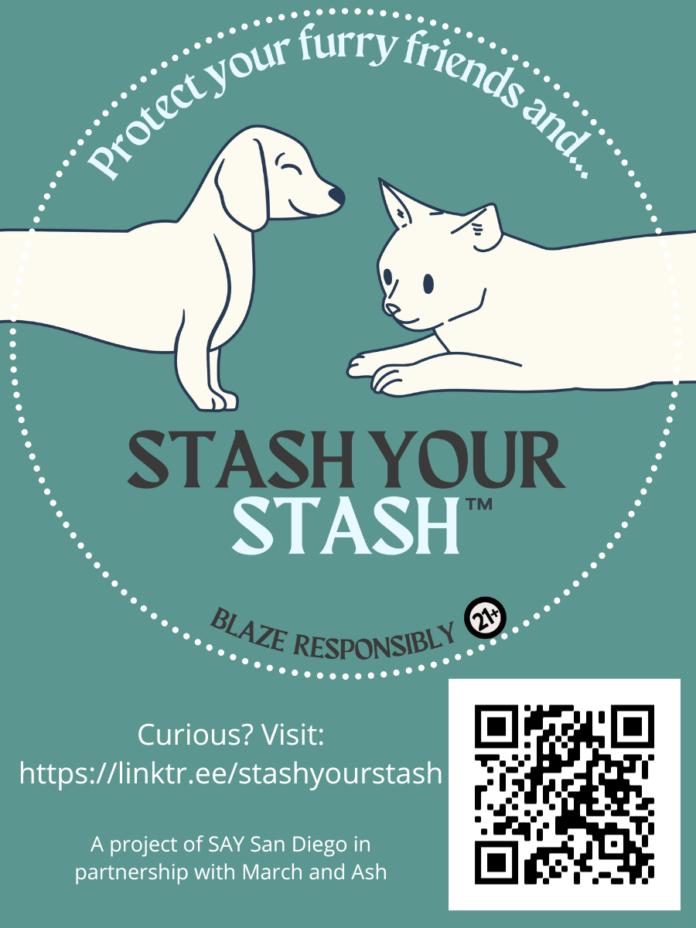SAY San Diego, and advocacy and educational nonprofit, works in collaboration with schools, community coalitions, and local government to create positive changes for the comprehensive needs of the child, individual, or family. In a unique partnership, SAY SD has recently partnered with the cannabis industry with its latest campaign Stash Your Stash, advocating San Diegans to store their cannabis products away from kids and pets. One of the leaders in the cannabis industry in San Diego, March and Ash has jumped onboard this campaign, hoping that others in the industry will follow.
In a recent study by the American Academy of Pediatrics, data from poison centers across the nation found a 1,375% rise in accidental cannabis ingestion among children under the age of 6 between 2017 and 2021.
The national data resonates with multiple state-level studies showing a correlation between cannabis legalization and an increase in children ingesting THC-infused edibles. Between 2010 and 2020, edible exposures reported to the California Poison Control System (CPCS) increased from near zero to 79%.
In tandem, cannabis toxicity is becoming more common in pets also. In the past six years, calls about marijuana poisoning to the Pet Poison Hotline have increased by 400%, with most calls reported in California and New York in a report from The New York Times.
Last year, the American Society for the Prevention
of Cruelty to Animals’ Poison Control hotline fielded nearly 7,000 calls for cannabis toxicity, an 11 percent increase from 2021.
Stash Your Stash’s mission comes to life in a series of six colorful stickers featuring eye-catching messages designed to spark consumer awareness of the importance of storing cannabis flowers, edibles, and concentrates responsibly. Provided to customers at the point of sale, the stickers encourage customers to “Protect Your Furry Friends — Stash Your Stash,” “Start Slow and Go Low,” and “Stay Classy, San Diego – Stash Your Stash.”
SAY SD Prevention Specialist Yugheipsy Lopez said the organization is the alcohol, tobacco, and other drug prevention team, with several contracts that focus on different prevention services and crime reduction practices that it wants the public to be aware of.
“This campaign, Stash Your Stash, is the Safeguard Project, trademarked with us and March and Ash is our first partners on this effort,” she said. “Stash Your Stash came about with this contract as a part of us wanting to focus on the public, marijuana prevention, and crime reduction strategies that we can really make an impact.”
Lopez said with the legalization of marijuana, they know there are recreational and medicinal users, but want to protect kids and pets, and everyone in the home from THC poisoning.
“We really want to emphasize, and we want people to store their stash safely, making sure it is out of reach of their children and their pets,” she said. “But also, to consume responsibly. Waiting to use their products until they get home, until they are somewhere safe, and letting people know that driving under the influence of marijuana is impaired driving, so there are some consequences from that. The culture around marijuana, people say, ‘doobie cruising,’ where they smoke and drive. We want to support sober driving and those kinds of practices to make sure everyone at home and on the road is safe.”
Lopez said they understand that people are going to consume but wants to advocate that they do it someplace that is safe. She said there has been a rise in the percentages from poison control and calls related to children and pets and between 2010 and 2020 edibles exposures in children and pets have increased 79%, according to the California Poison Control System.
“It is alarming,” she said. “Some people care for their pets as they do for their children, so this is something that is near and dear to the public’s heart. We want them to know that leaving it on the coffee table, counter, is something we are seeing in children and pets.”
Lopez said edibles are the products most likely to be seen in THC poisonings.
“Mostly because they can be gummies, if left around the packaging is really enticing also to youth or children. They just see nice colors, caricatures on packaging. If a child gets into it, they may be okay for a little while, but with edibles we know that the effects take longer to be felt. But, over the course of time they may slowly begin to get palpitations, something they cannot tell their parents, trouble breathing, and that is when parents become alarmed that they might have gotten into something they had.”
March and Ash Co-Founder, partner and general counsel Bret Peace said Stash Your Stash breaks the mold of traditional substance use prevention campaigns.
“Stash Your Stash demonstrates what cannabis entrepreneurs and community health advocates can accomplish together when we put aside our differences and find common ground,” he said.
Peace said the founding partners at March and Ash, which is still privately owned, all grew up in Jamul.
“What is important is that we all have kids,” he said. “We coach little league, soccer. When we founded March and Ash in 2017, it was a very different environment when you talk about interface between companies in the cannabis space and stakeholders like youth prevention and health professionals. This program was the outcome of many years of quiet partnership and trust building between March and Ash and folks at SAY San Diego and other stake holders.”
Peace said they are extremely proud that the relationship helps both his business and SAY SD’s mission.
“We have always had a hyperfocus on our workforce,” he said. “We are local. There has been a lot of consolidation in the industry, but we are one of the few companies still here that is locally and independently owned.”














